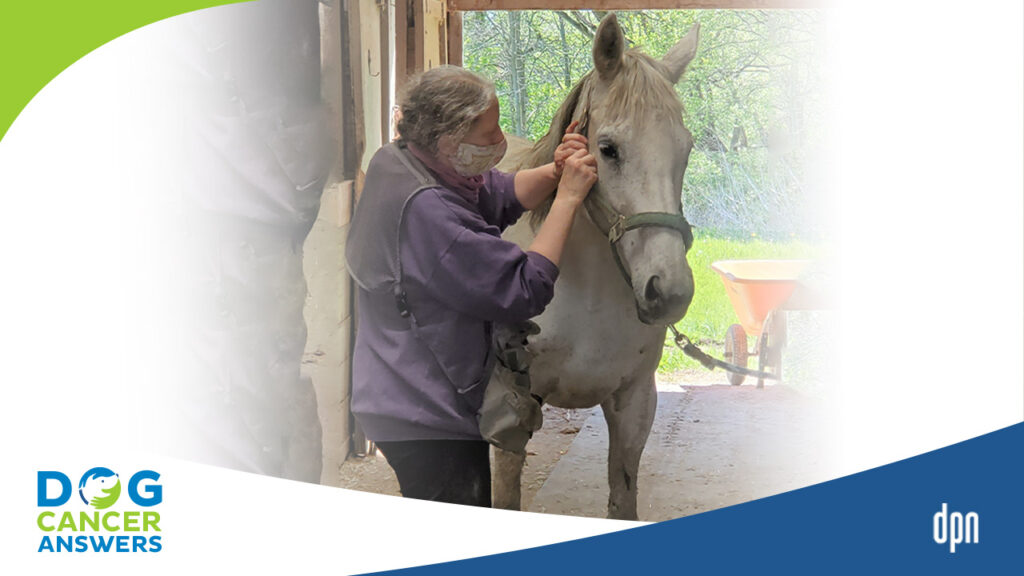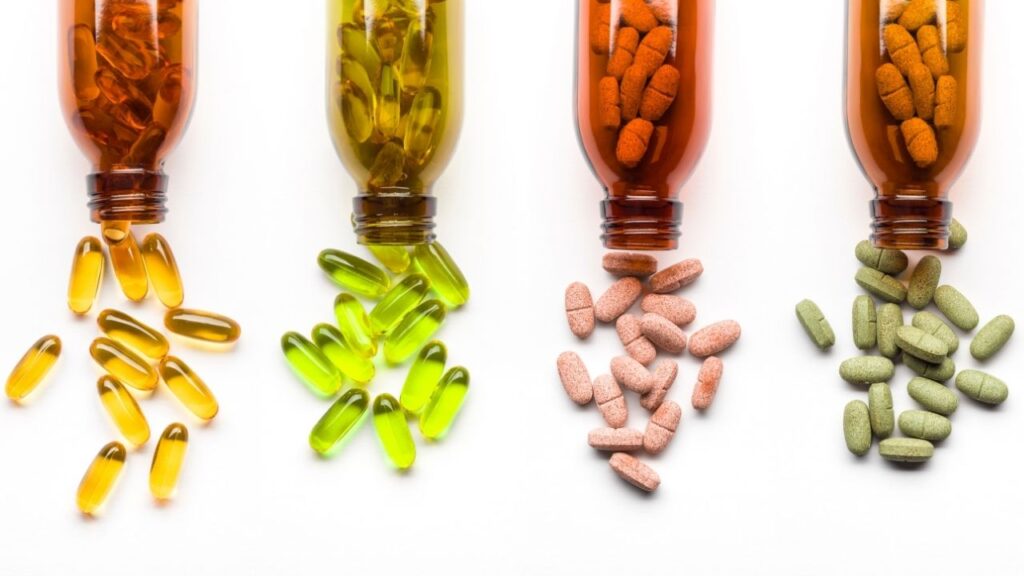Wei Qi Booster is a Traditional Chinese Veterinary Medicine (TCVM) formula that contains a combination of herbs used to boost the immune system. Pronounced “way chee,” the phrase translates to “defense system,” or as referred to in Western medicine, the immune system.
Key Takeaways
- Wei Qi Booster for dogs is an herbal formula used by integrative veterinarians to treat cancer and other chronic immune illnesses.
- “Wei Qi” means “defense system,” or “immune system.”
- Herbs in Wei Qi include Astragalus, Angelica, Lindera, citrus, Scutellaria, Oldenlandia, Scrophularia, and Codonopsis.
What Is Wei Qi Booster for Dogs?
Traditional Chinese Medicine (TCM) has been used in Asia for thousands of years.3 Its application to veterinary care is denoted by the term Traditional Chinese Veterinary Medicine (TCVM).
Wei Qi Booster is a type of botanical medicine used in TCVM that contains a combination of herbs with immune boosting and anticancer properties:
- Astragalus – Astragalus membranaceous has a number of active ingredients that can enhance anti-tumor efficacy when combined with chemotherapy.4
- Angelica – Angelica sinensis is beneficial due to the phenolic compounds found in its roots and is commonly prescribed as part of dietary therapy regimens.5
- Lindera – Lindera strychifolia is a shrub plant that has compounds in its roots that can destroy cancer cells.6
- Citrus – Citrus fruits contain a large number of flavonoids, which are compounds known to have anti-inflammatory and anticancer properties.5
- Scutellaria – Scutellaria baicalensis has been touted as the “golden herb” of Chinese medicinal plants and is thought to inhibit cell mutation and tumor growth.
- Oldenlandia – Oldenlandia diffusa has strong anti-proliferative affects against cancer cells while showing low levels cytotoxicity to healthy cells.7
- Scrophularia – Scrophularia species have roots that can play a strong role in inhibiting the creation of blood vessels in the body.8
- Codonopsis – Codonopsis pilosula is found in many formulas used in TCM because it contains lobetyolin. Lobetyolin contributes to drug-induced apoptosis, or cell death, and inhibits tumor growth. Evidence suggests that it works especially well for patients diagnosed with gastric cancer.1,9,10
Evidence for Efficacy
To understand how Wei Qi Booster can benefit your dog, it is important to understand the concept of “Qi” in TCM.
Qi is the broad and overarching life force inherent to all living things.3
- Imbalances or deficiencies in one’s Qi can depress the immune system, making it less effective at destroying and removing abnormal cells from the body.3
- Improving Qi in the body involves overcoming its deficiency to increase the function of white blood cells in the immune system, ultimately improving its surveillance capabilities to protect the body.3
Qi deficiency is one of the most common causes of cancer observed in TCM.3 This fits with the Western approach of cancer being an immune-mediated disease.
Dr. Cynthia Lankenau has been practicing Chinese Medicine for decades. She shares her insights on DOG CANCER ANSWERS.
Concepts in TCM, known as phlegm and blood stasis, in combination with Qi deficiency, can have catastrophic consequences for the body.3
- Phlegm, or the pathological accumulation of fluids, can be caused by an unhealthy diet, lifestyle, or even environment.
- Chronic Qi deficiency, blood deficiency, damp heat, phlegm, or any combination of those can lead to stagnation.
- Stagnation is when things don’t move well in the body. If you think of a healthy, clear-flowing river that gets clogged with garbage and filled with unhealthy chemicals, you can imagine it would slow down, and algae and gunk would start to form.
- If not corrected at the early stages, stagnation will progress into stasis.
- Stasis is an unmoving lump, bump, or what we call cancer.
- Blood pooling around a tumor can cause it to grow and metastasize to other body areas.
This is where herbal formulas like Wei Qi Booster can help. Wei Qi Booster works to combat Qi deficiency by amplifying the immune system. This makes it useful for many conditions, including cancer.11
Herbs in Wei Qi Booster
Some herbs found in Wei Qi Booster are strongly thought to serve cancer patients positively.
For example, plants in the genus Astragalus, known as Huang Qi in TCM, may help reduce tumors by inhibiting their growth and promoting the death of tumor cells, a process called apoptosis.4 Astragalus may also assist white blood cells in eliminating cancer cells.4
Cordonopsis pilosula, known as Dang Shen in TCM, is another component of Wei Qi Booster that may inhibit tumor growth and promote apoptosis in cancer cells.10
Lindera strychifolia has exhibited cytotoxic effects on cancer cells.6 One study researching lung cancer in the lab found that exposure to L. strychifolia inhibited cell growth and showed evidence of inducing apoptosis.6 Similarly, mice with lung cancer that were fed L. strychifolia had smaller tumors and lived longer than their untreated counterparts.6
Scrophularia species have shown efficacy at inhibiting angiogenesis, or the creation of blood vessels.8 This is important because tumors are dependent on the creation of blood vessels to deliver the nutrients they need to continue to grow. A study on the cell proliferation of bovine aortic endothelial cells found that S. ningpoensis had one of the strongest inhibition effects regarding angiogenesis among the 24 investigated herbs.8
Oldenlandia diffusa has shown a strong ability to stop cancer cells from growing while allowing healthy cells to proliferate. Research that fed O. diffusa extract to mice with lung cancer noted a 70% reduction in the mass of their tumors with no notable adverse side effects recorded.7
Wei Qi Booster Case Studies
Most of the published literature providing evidence of the effectiveness of Wei Qi Booster in dogs are isolated case studies:
- A six-year-old female Airedale Terrier was diagnosed with cervical fibrosarcoma and prescribed an herbal treatment of Wei Qi Booster and acupuncture. After the acupuncture regimen was completed, two herbal formulas were added to the dog’s treatment plan. Within nine weeks, there was no evidence of the dog’s tumor. The dog continues to take the three prescribed herbal formulas, including Wei Qi Booster, and has not had any tumor recurrence in three years.12
- A five-year-old male Labrador Retriever was diagnosed with oral squamous cell carcinoma with a questionable outlook on life expectancy, and an estimated three to six months of survival time. Western pain and anti-inflammatory medications were prescribed in conjunction with TCVM herbal formulas, including Wei Qi Booster, and a change in diet. Clinical signs improved over four to six months with a visible reduction in the oral mass. The dog was able to maintain a high quality of life for an additional five years after their first diagnosis.13
Common Uses of Wei Qi Booster for Dogs
Wei Qi Booster can be used to slow down metastasis and prevent tumors from recurring.3
Wei Qi Booster benefits most cancers because a decreased immune function is a characteristic common to all cancer types. However, other herb-based formulas may be recommended for use in tandem with Wei Qi Booster for specific cancer types.3
Other TCM practices, like acupuncture, may also be suggested to supplement Wei Qi Booster, depending on your dog’s needs.12
In addition to cancer, Wei Qi Booster can be used for other ailments caused by a deficiency in Qi, including anemia, kidney failure, fatigue, and general weakness.14
Integrative veterinary oncologist Dr. Kendra Pope explains why she uses herbs in her practice on DOG CANCER ANSWERS.
Safety and Side Effects
Wei Qi Booster is generally considered safe with no side effects.11 However, allergic reactions to any herbs included in the formula are always possible.11
Can Be Given With
Wei Qi Booster is dynamic and pairs well with other herbal formulas, including Qu Yu Fang (also known as Stasis Breaker under the brand Jing Tang Herbals) and Nei Xiao Lui Li San (also known as Max’s FormulaTM under the brand Jing Tang’s Herbals).11
Combinations of different herbal formulas will depend on the characteristics of your dog’s cancer.3
For example, Stasis Breaker will be used with Wei Qi Booster if the tumor is large and firm, while Max’s FormulaTM will be used if the tumor is soft or small.3
The type of cancer and location of the tumor may also be considered to prescribe a “Chinese Herbal Transporter.” For example, Xue Fu Zhu Yu Tang is recommended to treat mast cell tumors.3
Wei Qi Booster can also be used with other TCVM practices, such as prescribed changes in diet based on your dog’s needs for alleviating a Qi deficiency and acupuncture.3
In regard to conventional Western cancer treatment types, most herbs used in TCM, including Wei Qi Booster, can be used with radiation, chemotherapy, and surgery.3
When to Not Use Wei Qi Booster
Herbal formulas should not be used within 72 hours before or after radiotherapy.11
Though not well studied, practitioners claim that there are no antioxidants or vitamins in Wei Qi Booster that may interfere with removing free radicals deliberately introduced into the body to kill cancer cells using chemotherapy and radiotherapy.3,11
You shouldn’t give your dog Wei Qi Booster if they have acute inflammation or infection or are running a fever.9
What’s In Wei Qi Booster?
As with many herbal formulas, genuine concerns exist regarding what is actually in Wei Qi Booster. Many brands keep their formulas under wraps and label their products as having a combination of ingredients that are proprietary information.
This means that you, as the consumer, can’t get accurate information on what you are giving to your dog. In addition, low-quality manufacturing processes can introduce toxic metals and other contaminants into the product.
You should feel comfortable with what you’re giving your dog, especially for preventing or treating cancer.
If your holistic or integrative veterinarian recommends a specific brand of Wei Qi Booster, and they trust its provenance, that’s one thing. But if you have any doubts, it’s best to forgo this supplement altogether.
How to Give Wei Qi Booster to Dogs
Wei Qi Booster comes in powder form, as an extract, in capsules, and tea pills.9
The time that Wei Qi Booster can be used depends on the brand. Dr. Xie’s Wei Qi Booster can be administered for six months.9
What If I Miss a Dose?
Missing a dose will not have any severe consequences. Simply give your dog their next dose as planned. Do not double-dose your dog to “make up” for the missed dose.
Storage and Handling
If the Wei Qi Booster you purchase is in capsule, powder, or tea pill form, you can store it in its original bottle at room temperature.9
If you buy Wei Qi Booster in extract form, also called tincture form, you should keep it in the refrigerator.9
Be sure to look at the instructions for your particular product, which will be on the label.
Our Take on Wei Qi Booster for Dogs
Botanical medicine is a growing field in Western veterinary practice, but there’s some criticism. The secretive nature of brands that manufacture Wei Qi Booster make it difficult to know what’s in it truly.
While there’s science-based evidence for the anticancer properties of some of its components, scientific evidence for Wei Qi Booster as a formula effective at treating cancer is lacking. The evidence mostly comes from practical use and sharing of case knowledge.
Regardless, TCM has been in practice for thousands of years, and there’s a reason it is gaining a foothold in Western veterinary medicine. The ability of Wei Qi Booster to eliminate your dog’s cancer is not well supported, but it is highly regarded as safe to use and may at least increase your dog’s quality of life.
Dr. Katie Woodley's experience with her husband and dog led her to embrace herbal medicine. Her story on DOG CANCER ANSWERS.
- Wallis, C. The use of Chinese herbal medicine to treat cancer in dogs. Wild West Veterinary Conference, 2011. Veterinary Information Network. https://www.vin.com/doc/?id=5637731
- O’Leary, S. Wei Qi & tips to boost immunity. Mend Acupuncture. Published March 2, 2020. https://mendacupuncture.com/wei-qi-tips-to-boost-immunity/. Accessed on January 26, 2023.
- Xie H, Hershey B. Chinese herbal medicine for the treatment of cancer. Am J Trad Chin Vet Med 2015; 10(1):69-75
- Li S, Sun Y, Huang J, et al. Anti-tumor effects and mechanisms of Astragalus membranaceus (AM) and its specific immunopotentiation: Status and prospect. J Ethnopharmacol. 2020;258:112797. doi:10.1016/j.jep.2020.112797
- Cai Y, Luo Q, Sun M, Corke H. Antioxidant activity and phenolic compounds of 112 traditional Chinese medicinal plants associated with anticancer. Life Sci. 2004;74(17):2157-2184. doi:10.1016/j.lfs.2003.09.047
- Li YM, Ohno Y, Minatoguchi S, et al. Extracts from the roots of Lindera strychifolia induces apoptosis in lung cancer cells and prolongs survival of tumor-bearing mice. Am J Chin Med. 2003;31(6):857-869. doi:10.1142/S0192415X03001545
- Gupta S, Zhang D, Yi J, Shao J. Anticancer activities of Oldenlandia diffusa. J Herb Pharmacother. 2004;4(1):21-33.
- Wang S, Zheng Z, Weng Y, et al. Angiogenesis and anti-angiogenesis activity of Chinese medicinal herbal extracts. Life Sci. 2004;74(20):2467-2478. doi:10.1016/j.lfs.2003.03.005
- Concentrated Wei Qi Booster. Dr. Xie’s Jing Tang Herbal Store. https://store.tcvmherbal.com/store/viewFormula.asp?fid=227 . Accessed January 26, 2023.
- Bailly C. Anticancer Properties of Lobetyolin, an Essential Component of Radix Codonopsis (Dangshen). Nat Prod Bioprospect. 2021;11(2):143-153. doi:10.1007/s13659-020-00283-9
- Mitchell, L. Chinese herbal therapy top choices. Southwest Veterinary Symposium. Veterinary Information Network. 2021. https://www.vin.com/doc/?id=10521481. Accessed on January 26, 2023.
- Bearman J. Regression of a cervical fibrosarcoma in a dog using acupuncture and Chinese herbal therapy. Am J Trad Chinese Vet Med. 2010;5(1):67-71.
- Redfield C. Traditional Chinese veterinary medicine to treat oral cancer in a Labrador retriever. Am J Trad Chin Vet Med. 2022;17(2):39-45.
- Baumgartner, B. Wei Qi Booster strengthens dog immunity and helps renal failure. Pet Tao. Published June 20, 2017. https://pettao.com/wei-qi-booster-dog-immunity/. Accessed on January 26, 2023.
Topics
Did You Find This Helpful? Share It with Your Pack!
Use the buttons to share what you learned on social media, download a PDF, print this out, or email it to your veterinarian.









